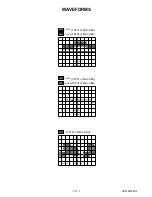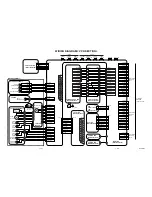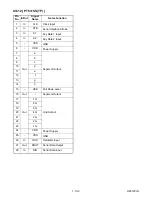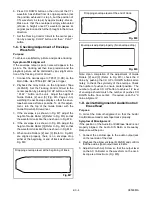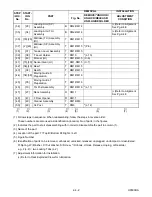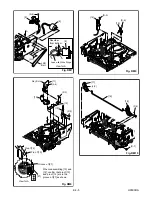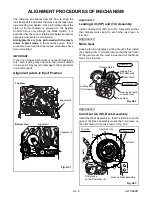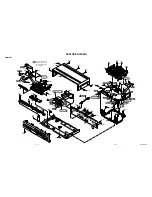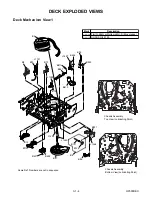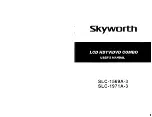
2-3-3
H9500MA
1-A. Preliminary/Final Checking and
Alignment of Tape Path
Purpose:
To make sure that the tape path is well stabilized.
Symptom of Misalignment:
If the tape path is unstable, the tape will be damaged.
Note: Do not use an Alignment Tape for this proce-
dure. If the unit is not correctly aligned, the tape may
be damaged.
1. Playback a blank cassette tape and check to see
that the tape runs without creasing at Guide Rollers
[2] and [3], and at points A and B on the lead sur-
face. (Refer to Fig M3 and M4.)
2. If creasing is apparent, align the height of the guide
rollers by turning the top of Guide Rollers [2] and
[3] with a Guide Roller Adj. Screwdriver. (Refer to
Fig. M3 and M5.)
3. Check to see that the tape runs without creasing at
Take-up Guide Post [4] or without snaking between
Guide Roller [3] and AC Head. (Fig. M3 and M5)
4. If creasing or snaking is apparent, adjust the Tilt
Adj. Screw of the AC Head. (Fig. M6)
1-B. X Value Alignment
Purpose:
To align the Horizontal Position of the Audio/Control/
Erase Head.
Symptom of Misalignment:
If the Horizontal Position of the Audio/Control/Erase
Head is not properly aligned, maximum envelope can-
not be obtained at the Neutral position of the Tracking
Control Circuit.
1. Connect the oscilloscope to TP301 (C-PB) and
TP503 (CTL) on the Main CBA. Use TP504 (RF-
SW) as a trigger.
2. Playback the Gray Scale of the Alignment Tape
(FL6NS8) and confirm that the PB FM signal is
present.
3. Set the Tracking Control Circuit to the center posi-
tion by pressing CH UP button then “ PLAY ” button
on the unit. (Refer to note on bottom of page
2-3-4.)
4. Use the X-Value Adj. Screwdriver so that the PB
FM signal at TP301 (C-PB) is maximum. (Fig. M6)
5. Press CH UP button on the unit until the CTL wave-
form has shifted by approx. +2msec. Make sure
that the envelope is simply attenuated (shrinks in
height) during this process so that you will know
the envelope has been at its peak.
Guide Roller [2]
Guide Roller [3]
A
B
Take-up Guide Post [4]
AC Head
Fig. M3
Lead Surface of Cylinder
Tape
Fig. M4
Guide Roller
Tape
Correct
Incorrect
Take-up Guide
Post
Tape
Fig. M5
Azimuth Adj. Screw
X-Value Adj.
Screwdriver
Tilt Adj. Screw
AC Head
Fig. M6
Summary of Contents for DCVR-4800
Page 29: ...Main 1 9 Schematic Diagram VCR Section 1 10 3 1 10 4 H9512SCM1...
Page 31: ...1 10 7 1 10 8 H9512SCM3 Main 3 9 Schematic Diagram VCR Section...
Page 32: ...Main 4 9 Schematic Diagram VCR Section 1 10 9 1 10 10 H9512SCM4...
Page 33: ...Main 5 9 Schematic Diagram VCR Section 1 10 11 1 10 12 H9512SCM5...
Page 34: ...Main 6 9 Schematic Diagram VCR Section 1 10 13 1 10 14 H9512SCM6...
Page 35: ...Main 7 9 Schematic Diagram VCR Section 1 10 15 1 10 16 H9512SCM7...
Page 36: ...Main 8 9 DVD Open Close Schematic Diagram VCR Section 1 10 17 1 10 18 H9512SCM8...
Page 37: ...1 10 19 1 10 20 Main 9 9 Schematic Diagram VCR Section H9512SCM9...
Page 39: ...1 10 23 1 10 24 Jack Schematic Diagram VCR Section H9512SCJ...
Page 40: ...1 10 25 1 10 26 Function Schematic Diagram VCR Section H9512SCF...
Page 41: ...1 10 27 1 10 28 AFV Schematic Diagram VCR Section H9512SCAFV...
Page 43: ...1 10 31 Main CBA Bottom View BH9510F01012A 1 10 32...
Page 47: ...DVD Main 1 3 Schematic Diagram DVD Section H9512SCD1 1 10 39 1 10 40...
Page 48: ...1 10 41 1 10 42 DVD Main 2 3 Schematic Diagram DVD Section H9512SCD2...
Page 50: ...DVD Main 3 3 Schematic Diagram DVD Section 1 10 45 1 10 46 H9512SCD3...
Page 97: ...DCVR 4800 H9512FD...

